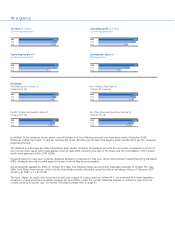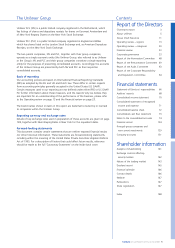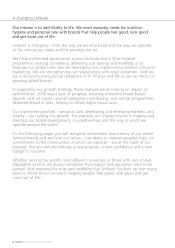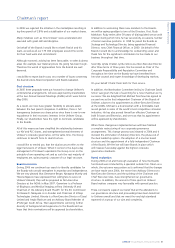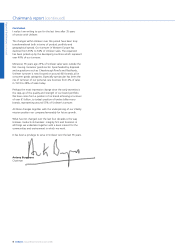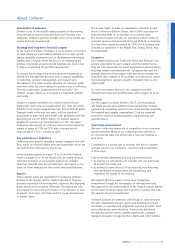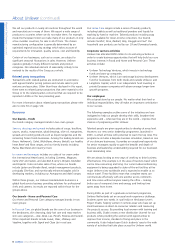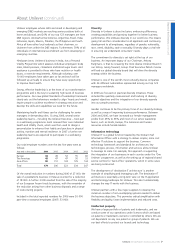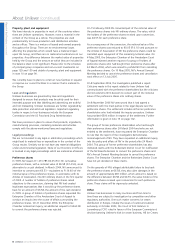Unilever 2006 Annual Report Download - page 13
Download and view the complete annual report
Please find page 13 of the 2006 Unilever annual report below. You can navigate through the pages in the report by either clicking on the pages listed below, or by using the keyword search tool below to find specific information within the annual report.
10 Unilever Annual Report and Accounts 2006
Report of the Directors (continued)
About Unilever (continued)
We have a number of large global brands, including 12 with an
annual turnover greater than €1 billion, which often depend on
global or regional development and supply chains. Any adverse
event affecting consumer confidence or continuity of supply of
such a brand could have an impact in many markets. The carrying
value of intangible assets associated with our brands is significant,
and depends on the future success of those brands. There
remains a risk that events affecting one or more of our global
brands could potentially impair the value of those brands.
As the retail market place through which our products are
distributed continues to evolve, our growth and profitability can
be threatened if we do not adapt our strategies and enhance our
operational capabilities. It is important that we continue to build
and deepen relationships with our customers. Plans to raise our
effectiveness in the trade, where necessary, receive increasing
attention at all levels.
Change initiatives
The continuing restructuring of the business which is designed to
simplify our operations and leverage our scale more effectively,
includes outsourcing back office support operations and
converging regional processes and systems, and requires
continuing close management attention in 2007. Building on the
experiences of 2006, we will continue to manage the risks in this
area diligently and ensure that there are clear action plans to
mitigate them. Key to this is the establishment and maintenance
of project management processes to monitor progress against
milestones and targets together with appropriate communication
programmes.
People
Unilever’s performance targets require it to have the right calibre
of people at all levels. Wemust compete to obtain capable
recruits for the business, and then train them in the skills and
competencies that we need to deliver profitable growth. At a
time of substantial change in the business there is a particular
focus on creating alignment and energetic leadership, evidenced
by the senior leadership programme that was launched in 2006.
Corporate reputation
Unilever has created a strong corporate reputation over many
years and many of our businesses have a high local profile. This
reputation is underpinned by ensuring that all employees embrace
the principles prescribed in our Code of Business Principles.
Unilever products carrying our well-known brand names are sold
in over 100 countries. Should we fail to meet high product safety,
social, environmental and ethical standards in all our operations
and activities, Unilever’s corporate reputation could be damaged,
leading to the rejection of our products by consumers, damage to
our brands and diversion of management time into rebuilding our
reputation.
Potential economic instability
Around 40% of Unilever’s turnover comes from the developing
and emerging economies. We have long experience in these
markets, which are also an important source of our growth. These
economies are typically more volatile than those in the developed
world, and there is a risk of downturns in consumer demand that
would reduce the sales of our products. We will continue to
monitor closely performance in the most volatile markets and
respond quickly to protect our business. In cases of extreme social
disruption, protecting our people is always the priority.
Price and supply of raw materials and
commodities contracts
Prices of raw materials and commodities increased significantly
throughout 2006, adversely impacting margin where we were
unable to pass on increased costs. To mitigate such risks, and
where appropriate, we purchase forward contracts for raw
materials and commodities, almost always for physical delivery.
Where appropriate we also use futures contracts to hedge future
price movements; however, the amounts are not material.
Insurance of risks
As a multinational group with diverse product offerings and
operations in more than 100 countries, Unilever is subject to
varying degrees of risk and uncertainty. It does not take out
insurance against all risks and retains a significant element of
exposure to those risks against which it does insure. However,
it insures its business assets in each country against insurable
risks as it deems appropriate.
Financial risks
In addition to the above, Unilever is exposed to various specific
risks in connection with its financial operations and results.
These include the following:
• The impact of movement in equity markets, interest rates and
life expectancy on net pension liabilities;
• Maintenance of group cash flows at an appropriate level;
•Exposureof debt and cash positions to changes in interest rates;
• Potential impact of changes in exchange rates on the Group’s
earnings and on the translation of its underlying net assets;
• Liquidity and counterparty risks; and
• Risks associated with the holding of our own shares in
connection with share-based remuneration schemes.
Further information about these, including sensitivity analysis to
changes in certain of the key measures, is given in note 17 on
pages 100 and 101 and note 20 on page 105.
Other risks
Unilever’s businesses are exposed to varying degrees of risk and
uncertainty related to other factors including competitive pricing,
consumption levels, physical risks, legislative, fiscal, tax and
regulatory developments, terrorism and economic, political, and
social conditions in the environments wherewe operate. All of
these risks could materially affect the Group’s business, our
turnover, operating profit, net profit, net assets and liquidity.
There may be risks which are unknown to Unilever or which are
currently believed to be immaterial.


